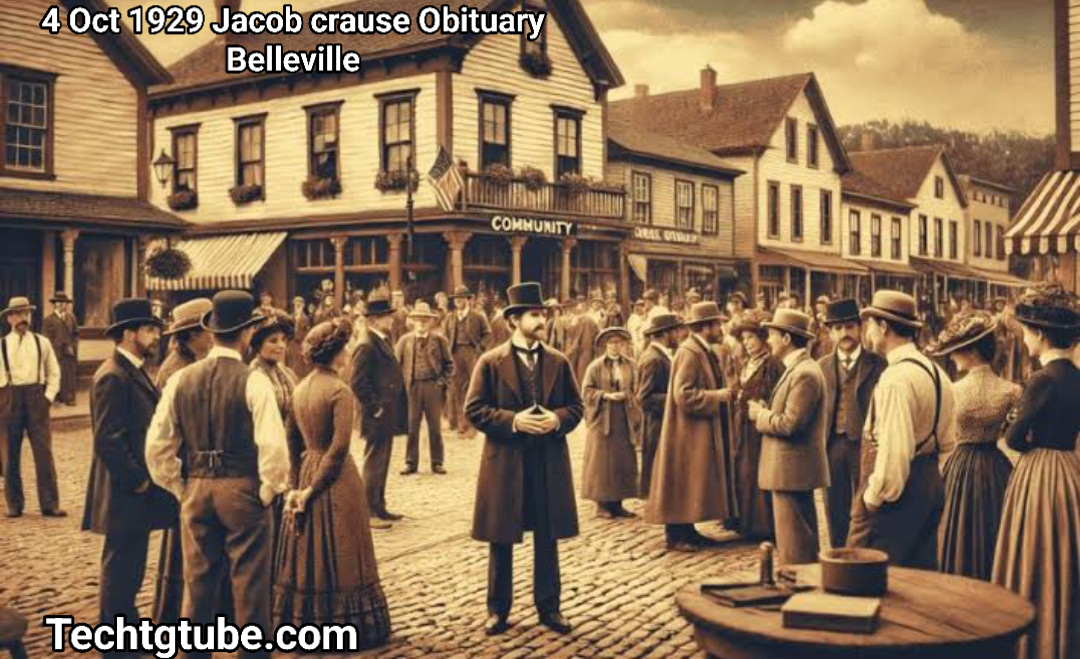Jacob Crause’s obituary, published on October 4, 1929, in Belleville, offers a glimpse into the life of a man who lived during a transformative period in history. Born during a time when the world was rapidly changing, Crause witnessed major global events like the Industrial Revolution, World War I, and the economic turmoil that followed the Wall Street Crash of 1929. His obituary, like many others, does not merely serve as a notice of death but also provides insight into the values, relationships, and experiences that shaped his life.
In this article, we will explore Jacob Crause’s life, the context in which he lived, and how obituaries from the early 20th century were more than just announcements of death; they were cultural artifacts that preserved the memories of individuals for future generations. We will also reflect on the role of Belleville in Crause’s life and the broader historical and social contexts that defined this period.
Early Life and Family Background
Jacob Crause was born in the late 19th century, a time of significant change both in the United States and around the world. Industrialization was in full swing, with factories, railroads, and urban centers growing rapidly. It was during this era of opportunity and challenge that Jacob’s family, likely immigrants or the descendants of immigrants, settled in Belleville, a town that was known for its rich history and growing industrial presence.
Belleville, located in Illinois, had been a town marked by 4 Oct 1929 Jacob crause Obituary Belleville waves of immigration, particularly from Germany and other European countries. The town’s culture was shaped by these diverse influences, and Jacob’s upbringing would have been deeply intertwined with the working-class ethos that defined Belleville during this time. The Crause family was likely involved in one of the many trades or industries that were flourishing in the region, contributing to the local economy and the growth of their community.
A Man of the Community
By the time Jacob Crause reached adulthood, Belleville had become a bustling hub of activity. Its proximity to St. Louis, Missouri, made it a key player in the region’s industrial and commercial growth. Many residents worked in the coal mines, manufacturing plants, or small businesses that dotted the landscape. Jacob, too, would have been part of this working-class fabric, either as a laborer or perhaps as a small business owner.
What set Jacob apart, however, was not merely his participation in Belleville’s economic life, but his commitment to the community. In obituaries from this era, it was common for the deceased’s contributions to their local area to be noted. This suggests that Jacob was likely involved in various social or civic activities. He might have been a member of local fraternal organizations, church groups, or charitable societies, which were important aspects of community life at the time.
Belleville’s close-knit community 4 Oct 1929 Jacob crause Obituary Belleville would have meant that Jacob’s life was deeply interconnected with those around him. The bonds he formed with his neighbors, coworkers, and fellow townspeople would have defined his identity as much as his work or family life. In a time before mass communication and globalized culture, people like Jacob played a crucial role in maintaining the social fabric of their communities.
Family Life and Personal Relationships
Though obituaries often focus on public life, they also offer a window into the personal relationships that shaped an individual’s experience. For Jacob Crause, family would have been a central part of his existence. His obituary would have likely mentioned his surviving relatives, possibly a spouse, children, and grandchildren. It might have also noted siblings, cousins, or other extended family members, reflecting the importance of kinship in early 20th-century America.
Family life during this period was defined by traditional roles, with men typically serving as the primary breadwinners and women managing the household. However, the early 20th century was also a time of change, as women began to assert more independence and the dynamics of family life started to shift. Jacob’s family might have experienced some of these changes firsthand, particularly if his children or grandchildren were part of the younger generation that was beginning to challenge societal norms.
In addition to his immediate family, Jacob’s obituary might have acknowledged the friendships and personal connections that were important to him. In smaller towns like Belleville, friendships often lasted a lifetime, with individuals maintaining strong ties to their neighbors and community. These relationships would have been a source of support and companionship for Jacob throughout his life.

The Historical Context of 1929
The year 1929 was a pivotal one in American history. The stock market crash in October of that year marked the beginning of the Great Depression, a period of economic hardship that would last for over a decade. Although Jacob Crause passed away just before the crash, the economic uncertainty and social upheaval of the late 1920s would have undoubtedly influenced his final years.
During the 1920s, the United States had experienced a period of economic growth known as the “Roaring Twenties.” This era was characterized by technological innovation, mass consumerism, and a sense of optimism about the future. However, beneath the surface, there were signs of trouble. Economic inequality was on the rise, and many working-class families, like those in Belleville, were struggling to make ends meet.
For individuals like Jacob, who had lived through earlier periods of economic hardship, the uncertainty of the late 1920s would have been a familiar 4 Oct 1929 Jacob crause Obituary Belleville challenge. His obituary might have alluded to these broader societal issues, reflecting the ways in which ordinary people were affected by the shifting economic landscape.
Belleville in the 1920s: A Community in Transition
Belleville itself was also undergoing significant changes during this time. As industries modernized and new technologies emerged, the town’s economic base began to shift. Coal mining, which had been a major industry in the region, was declining, while manufacturing and other forms of employment were on the rise.
Despite these changes, Belleville remained a tight-knit community, where residents supported one another through difficult times. This sense of solidarity would have been especially important in the late 1920s, as the country began to experience the economic downturn that would eventually lead to the Great Depression.
Jacob Crause’s life was deeply intertwined with the fortunes of Belleville. His work, his relationships, and his experiences were all shaped by the town’s unique history and culture. As a member of this community, Jacob would have been part of the larger story of Belleville’s growth and transformation during the early 20th century.
Legacy and Reflection
Obituaries are more than just announcements 4 Oct 1929 Jacob crause Obituary Belleville of death; they are reflections of the lives that individuals led and the impact they had on their communities. Jacob Crause’s obituary, published on October 4, 1929, in Belleville, serves as a reminder of the importance of remembering the ordinary people who shaped history in quiet, often unrecognized ways.
While Jacob may not have been a famous figure, his life was significant to those who knew him and to the town of Belleville as a whole. His contributions to his community, his relationships with his family and friends, and his experiences as a working-class man during a time of great change all speak to the broader themes of resilience, connection, and community that defined early 20th-century America.
Conclusion
The obituary of Jacob Crause from October 4, 1929, offers a window into the life of a man who lived through a period of profound change. His story is one of resilience, community, and the enduring importance of family and 4 Oct 1929 Jacob crause Obituary Belleville relationships. While much has changed since Jacob’s time, the themes that defined his life—hard work, commitment to family, and involvement in community—are still relevant today.
By reflecting on Jacob’s life and the historical context in which he lived, we gain a deeper understanding of the challenges and triumphs of ordinary people in early 20th-century America. His obituary is not just a notice of death; it is a testament to a life well-lived and a reminder of the importance of preserving the memories of those who came before us.
FAQs About “4 Oct 1929 Jacob Crause Obituary Belleville”
- Who was Jacob Crause? Jacob Crause was a resident of Belleville, Illinois, who lived during the late 19th and early 20th centuries. His life, as reflected in his obituary from October 4, 1929, was deeply connected to his community and the historical events of his time.
- What was significant about October 4, 1929? The date marks the publication of Jacob Crause’s obituary in Belleville, Illinois. This period was just before the stock market crash of 1929, which led to the Great Depression, a time of great economic and social upheaval in the United States.
- What was life like in Belleville during Jacob Crause’s time? Belleville was a growing industrial town with a strong working-class community. Many residents, including Jacob, were likely involved in industries such as coal mining or manufacturing. The town had a rich cultural history, shaped by waves of European immigration.
- Why are obituaries important historical documents? Obituaries provide valuable insights into the lives of individuals and the communities they were part of. They reflect personal relationships, societal values, and historical contexts, making them important cultural artifacts for future generations.
- What can we learn from Jacob Crause’s obituary? Jacob Crause’s obituary offers a glimpse into his life, his role in the Belleville community, and the broader historical and social context of the early 20th century. It serves as a reminder of the importance of ordinary individuals in shaping history.
Also read this; ivey-barbiciu-de-hornill-de-gaz











